
Eco-Friendly Tea: Introduction
Welcome to this week’s sustainability tip where we focus on the importance of Eco-Friendly Tea. Every cup of traditional tea holds a story of environmental impact, from cultivation and harvesting to packaging and distribution.
In this guide, we’ll break down the issues with conventional tea farming and explore the benefits of eco-friendly tea practices. We will also introduce you to brands that are making a positive impact on our planet. For example, eco-friendly tea practices can help to reduce water usage, decrease carbon emissions, and improve soil quality. By choosing eco-friendly tea brands, you can have a positive impact on the environment while enjoying a delicious cup of tea.
We hope this week’s tip inspires you to choose eco-friendly tea products and support brands that prioritise the environment. By making small changes in our daily lives, we can have a big impact on the world around us. Remember, every cup of tea counts!
Non Eco-Friendly Tea: The History
Tea’s story begins over 5,000 years ago in ancient China, where legend has it that Emperor Shen Nong discovered the drink when a wild tea leaf fell into his boiling water. The infusion was delightful and thus began tea’s journey to becoming a cultural phenomenon. Initially appreciated for its medicinal qualities, tea evolved into a daily beverage across Asia. It become deeply ingrained in the social and spiritual traditions of countries from China to Japan.
By the 17th century, tea had made its way to Europe through Portuguese and Dutch traders. It quickly became a status symbol among the continent’s elite.
The British, recognising its potential for profit, began importing large quantities from China. This lead to the infamous Boston Tea Party protest against heavy tea taxes that ultimately catalysed the American Revolution.
In response, the British began cultivating tea in their Indian and Ceylon colonies, diversifying its sources and solidifying its position as a global commodity.
Throughout history, tea has been more than just a drink; it has influenced politics, economics, and culture.
Today, tea is the second most consumed drink globally, with millions enjoying it every day.

As we continue to appreciate this ancient beverage, it’s important to be mindful of its environmental impacts and support the movement towards eco-friendly tea production.
Non Eco-Friendly Tea: Environmental Impact
Traditional tea production has a significant impact on the environment, and it’s essential to understand the issues associated with it. Large-scale tea plantations often involve clearing vast areas of forests, which results in the loss of biodiversity, habitat destruction, and increased carbon emissions. The monoculture nature of these plantations can also cause soil erosion and reduce soil fertility. This is because the constant cultivation of a single crop depletes the ground of vital nutrients.
Moreover, conventional tea farming relies heavily on chemical inputs such as synthetic fertilisers, pesticides, and herbicides. These chemicals not only degrade the soil but also contaminate local waterways, affecting both aquatic life and human health downstream. This chemical runoff can lead to toxic algal blooms and dead zones in bodies of water, severely disrupting ecosystems.
In addition to the chemical use, the processing of tea leaves is also resource-intensive. It requires significant amounts of water and energy, particularly during the withering, rolling, and drying stages. The carbon footprint is further increased by the global distribution of tea, involving long-distance transportation and packaging, which often utilises non-recyclable materials.
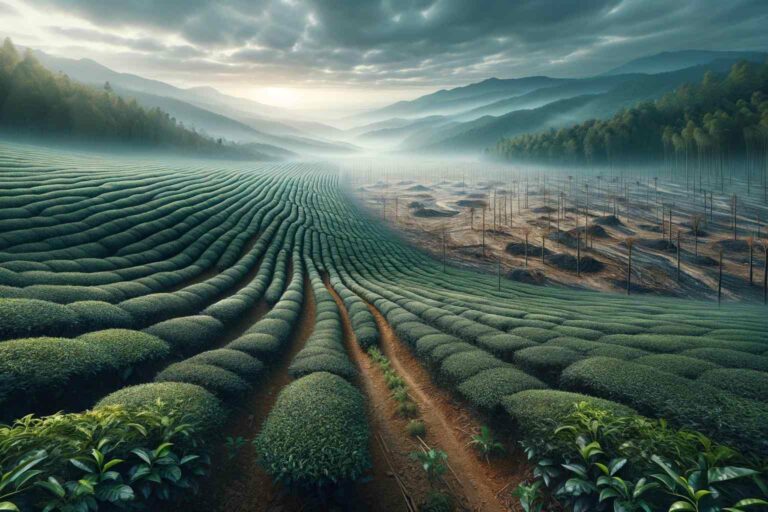
Keep reading to discover what to look for when selecting eco-friendly tea, ensuring that your choices have a positive impact on the environment.
Eco-Friendly Tea: What to Look For
When choosing eco-friendly tea, focusing on certifications and sourcing practices is crucial. Look for the Soil Association certification, which ensures the tea is organically grown without synthetic pesticides or fertilisers, enhancing soil health and ecosystems.
The Fairtrade certification is vital as it guarantees that tea producers receive fair prices and workers enjoy better conditions, fostering sustainable community development. Additionally, the Rainforest Alliance certification confirms sustainable production practices that conserve wildlife and ensure worker well-being.
Beyond certifications, consider the tea’s sourcing strategy. Opt for brands that source directly from farmers, as direct trade often provides more transparency and greater economic benefits to tea-growing communities. This approach typically ensures a higher quality product and supports sustainable agricultural practices by allowing farmers to invest in eco-friendly technologies and methods.
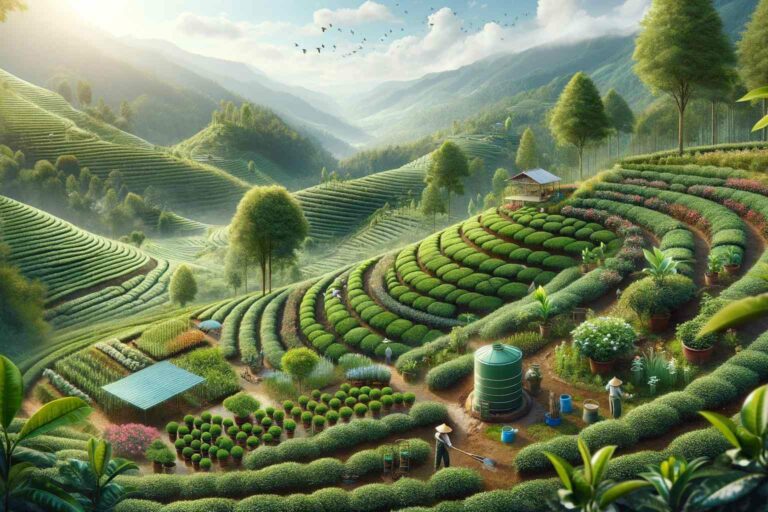
Packaging also plays a significant role in sustainability. Choose tea packed in biodegradable or recyclable materials to minimise environmental impact. By selecting tea that aligns with these practices, you contribute to a healthier planet and support ethical trade practices. Your choices help drive the demand for sustainable methods in the tea industry, paving the way for a greener future.
Eco-Friendly Tea: Three of Our Favourite Brands
Hampstead Tea
Hampstead Tea is renowned for its commitment to biodynamic farming, ensuring that all their teas are organically grown and ethically sourced. Their range includes a variety of single-estate teas that are both Fairtrade and Soil Association certified, reflecting their dedication to environmental and social responsibility. Each product comes in eco-friendly packaging, supporting the company’s mission to provide purity and health in every cup. Explore Hampstead Tea’s offerings online for a taste of truly sustainable luxury. Head to their website and use code PLAYITGREEN15 for a 15% discount on your first order!
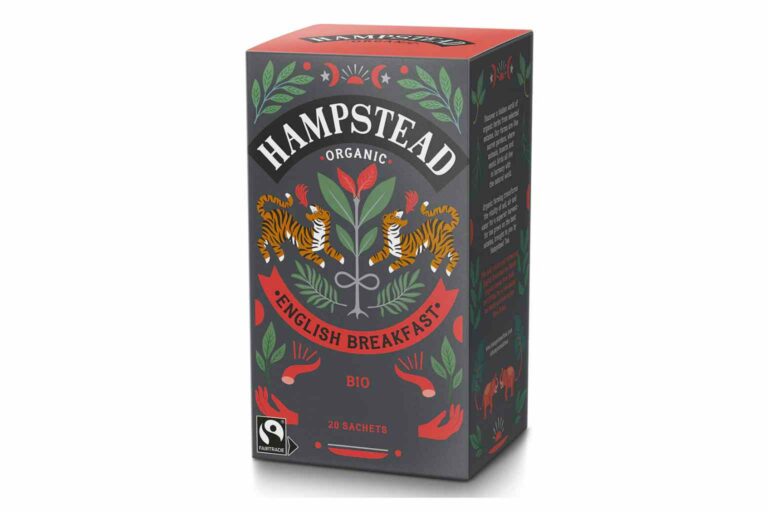
Revolver Coop Tea
A cooperative with a heart, Revolver Coop Tea focuses on cooperative principles, ensuring fair and ethical trade practices. Their teas are Fairtrade certified, sourced from smallholder farms that prioritise the welfare of their communities and the environment. Revolver Coop offers a range of organic teas that support sustainable agriculture initiatives, helping to improve livelihoods while maintaining ecological balance. Discover the difference ethical sourcing makes by visiting their online shop and use code PLAYITGREEN10 for a great discount on your first order!
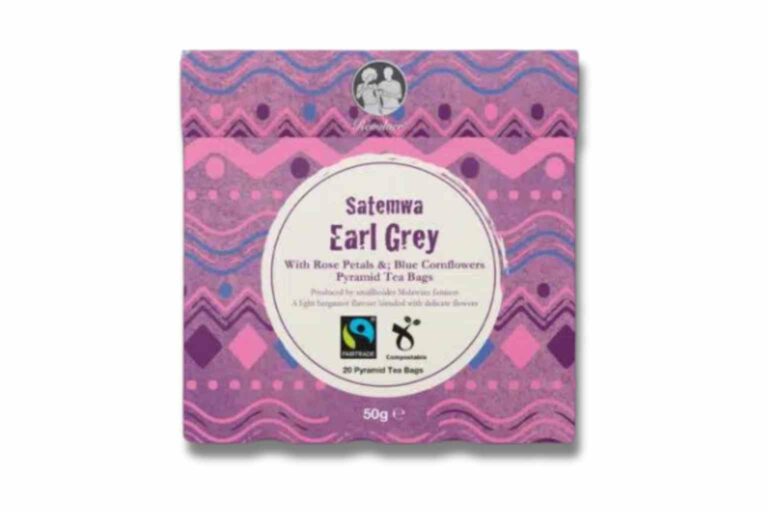
Hambleden Herbs Green and Black Tea
Hambleden Herbs is celebrated for its organic, Soil Association-certified teas, including both green and black varieties. Committed to sustainability, their teas are packaged in fully recyclable materials and are free from artificial additives, ensuring a natural brewing experience. Hambleden Herbs’ dedication to maintaining ecological integrity makes their products a top choice for environmentally conscious tea drinkers. Check out their diverse selections online.
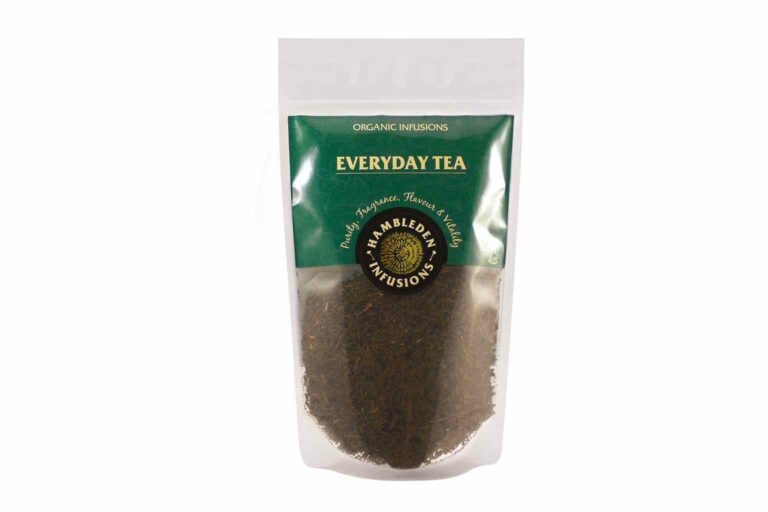
Eco-Friendly Tea: Wrap Up
Choosing eco-friendly tea from brands like Hampstead Tea, Revolver Coop, and Hambleden Herbs not only elevates your tea experience but also supports ethical and environmentally friendly practices. These companies are pioneers in the movement towards sustainability, demonstrating that our choices as consumers can significantly impact the planet and its people.
By opting for teas that are responsibly sourced and beautifully crafted, we endorse a healthier, greener future. Let’s continue to make conscious choices with every sip we take. eco-friendly tea goes beyond just taste; it’s about participating in a global effort to nurture the environment and promote fair trade. Join us at Play It Green in this delightful and meaningful journey towards sustainability.
Play It Green: Empowering Your Sustainability Journey
Ready to take your commitment to sustainability to the next level? Play It Green stands as your partner in creating positive environmental change. From educational resources on sustainable practices and signposting to sustainable services to initiatives like tree planting and social giving, Play It Green offers a holistic approach to environmental stewardship.
Join us in the journey toward sustainability—embrace eco-conscious practices and be a force for positive change in our world. All whilst staying relevant, meeting legislation and aligning with the values of today’s consumers and employees.







